Megan Campbell and Madison McDaniel, Feedback Labs | April 8th, 2022
This is the second in a series of posts contributed by the Feedback Incentives Learning Group, a group of funders convened by Feedback Labs that are dedicated to encouraging peer funders to listen to the people most harmed by the systems and structures they seek to change and supporting their grantees to listen as well. In this blog series, learning group members share their insight into and experiences with encouraging foundations and nonprofits to listen and respond to the people who are most impacted and often least consulted by philanthropy and nonprofits. The first blog in the series is here. This blog was originally posted by the Center for Effective Philanthropy.
During a site visit to the Memphis Child Advocacy Center, the Plough Foundation asked some “decidedly non-routine” questions about how the center was listening to the people affected by their work. The center had recently upgraded its security system with a grant from the foundation, and when Plough’s director of research and evaluation visited the Center, she suggested the Center ask staff, volunteers, and clients whether the upgrades had helped them feel safer. Having a funder start a conversation about how the Center could listen felt different, according to its executive director, but it also inspired the Center to find more ways to listen to its clients. And while responses to its initial staff survey about the security upgrades were positive, it also uncovered gaps in communication around security.
When a foundation encourages and supports its grantees to listen to the people at the heart of their work, great things happen. But how many foundations start these conversations with their grantees, as the Plough Foundation did? And what support can funders offer to grantees to enable them to listen better? These were the questions that the Feedback Incentives Learning Group set out to answer. They hypothesized that asking grantees how they listen and providing listening-specific capacity-building support were two easy ways that foundations could start supporting their grantees to listen better. But they didn’t know how many foundations were already engaging in those conversations or providing that support.
To find out, the Feedback Incentives Learning Group worked with CFLeads, Grantmakers for Effective Organizations, and the National Center for Family Philanthropy to design and distribute a survey to foundation staff and trustees across the United States and around the world. Together, they surveyed 121 representatives of 112 foundations to find out whether and how they ask their grantees how they listen to the people most impacted by their work, and whether and how they support their grantees to listen better. They heard from trustees and staff at all levels of community, family, private, and corporate foundations.
Survey responses by foundation type
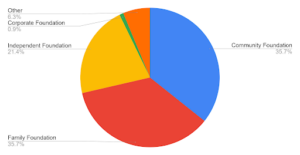
Survey responses by type of foundation representative
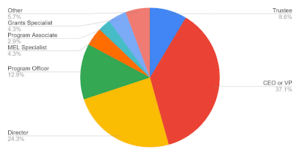
The survey results were heartening, yet also demonstrate that we have further to go as funders in encouraging and supporting grantees to listen to the people most affected by their work. Here are a few key takeaways from the survey’s results:
- Surveyed foundations care about how their grantees listen. Sixty-four percent of surveyed foundations ask their grantees how they listen, and about 40 percent that don’t ask are considering asking in the future.
- Foundations are increasingly supporting their grantees to listen better. Thirty-six percent of surveyed foundations offer support to help their grantees listen better, and 60 percent that don’t currently offer listening-related support are considering doing so in the future.
- Perceptions of foundation practice differ between different types of foundation representatives. While the patterns presented here are consistent across different types of foundations, trustees and program officers report different foundation practices than CEOs, VPs and directors.
Surveyed foundations care about how their grantees listen
Sixty-four percent of surveyed foundations ask either their prospective or current grantees, or both, how they listen to the people they seek to serve. They overwhelmingly use formal methods to ask — 79 percent of foundations that ask prospective grantees and 81 percent of foundations that ask current grantees how they listen use at least one formal method to do so. Application questions are a popular way to ask prospective grantees how they listen to the people at the heart of their work, as are report questions for current grantees. Conversations (both formal and informal) are also widely used.
Proportion of surveyed foundations that ask grantees how they listen

Methods that surveyed foundations use to ask grantees how they listen
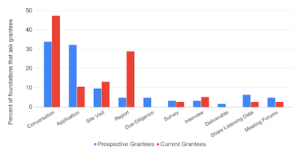
It appears that foundations asking grantees how they listen is a practice that is gaining traction. A significant portion of surveyed foundations that don’t currently ask prospective or current grantees how they listen are considering asking in the future. Forty-three percent are considering asking prospective grantees how they listen to the people at the heart of their work, and 37 percent are considering asking current grantees.
These patterns hold across all types of surveyed foundations, although notably a greater percentage of surveyed foundations based outside the United States report asking grantees how they listen compared to foundations based in the United States (80 percent versus 61 percent). Furthermore, none of the surveyed foundations based outside the United States use application questions to ask grantees how they listen, preferring conversations. (These differences may be driven by a smaller sample size — only eleven of the 112 surveyed foundations are based outside the United States.)
Foundations are increasingly supporting their grantees to listen better
Thirty-six percent of surveyed foundations offer capacity-building support to help their grantees better listen to and incorporate the voices and perspectives of the people they ultimately serve. Funding for listening exercises is the most commonly offered capacity-building support, with training on listening and access to listening tools coming in second. Fifty-six percent of the foundations that currently offer at least one type of listening-related capacity-building support to their grantees are considering offering other types in the future.
Types of listening-related capacity building support surveyed foundations currently offer their grantees
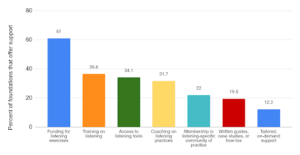
Perhaps more importantly, 60 percent of the surveyed foundations that don’t currently offer any listening-related capacity support are considering offering some support in the future. Looking at the graph below, we see that foundations that don’t currently offer listening-related capacity-building support are most strongly considering offering access to listening tools in the future. This begs the question, why are foundations that don’t currently offer support not considering offering funding for listening exercises, when in practice that is the most commonly provided support that foundations currently offer? Are there lessons that foundations newer to supporting grantee listening can learn from foundations that have already tested various approaches to providing listening-related capacity support?
Types of listening-related capacity-building support foundations that don’t currently offer support are considering offering in the future
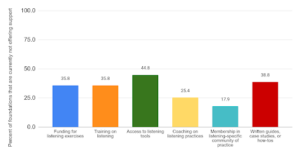
Perceptions of foundation practice differ between different types of foundation representatives
The patterns described above are consistent across the different types of foundations represented in the survey responses. Yet when we look at responses from the 70 survey respondents who provided their job titles, we see intriguing discrepancies in what different types of foundation representatives say about whether their foundation asks grantees how they listen and how they support them to listen better. For example, 83 percent of surveyed trustees, all of whom represented family foundations, say that the foundation they represent asks either prospective or current grantees, or both, how they listen. Yet only 55 percent of surveyed staff (including CEOs, VPs, directors, program officers, MEL specialists, grants managers, and associates) that represent family foundations say that their foundations ask grantees how they listen.
Proportion of family foundation trustees (left) versus staff (right) that say their foundation asks grantees how they listen
Surveyed trustees also reported that their foundations provide capacity-building support at higher rates than fa

mily foundation staff (50 percent versus 25 percent). Trustees were more likely to report that their foundation offered grantees access to listening tools and training on listening than staff of family foundations.
Listening-related capacity building supports that family foundation trustees say their foundations offer (left) versus support that family foundation staff say their foundations offer (right)
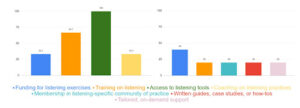
Surveyed program officers, who represented community, family, and independent foundations, consistently reported that their foundations either asked both current and prospective grantees how they listen or didn’t ask either. Yet CEOs, VPs, and directors representing the same types of foundations were more likely to report that their foundation only asks prospective grantees how they listen.
Proportion of program officers (left) versus directors (middle) versus CEO & VPs (right) that say their foundations ask grantees how they listen

Does this reflect actual differences in the ways that different foundations encourage and support grantees to listen, or does it point to a high variation of practices around supporting grantee listening, or awareness of those practices, within foundations? Anecdotal evidence from the survey suggests it may be the latter — seven foundations were represented in the survey by multiple respondents, and for six of them, respondents from the same foundation gave different answers about whether the foundation asks prospective grantees whether they listen to the people at the heart of their work.
Foundations increasingly recognize that it’s essential that grantees be able to listen and respond to the people most impacted by their work. Asking grantees how they listen, starting a conversation about what they need to listen better, and then providing support to help them increase their ability to meaningfully respond to the people at the heart of their work, are easy ways that foundations can support more equitable programs and advocacy that align with community desires. Foundations seem to be increasingly taking these steps. Is your foundation doing the same? To go further:
- Check out the Funder Action Menu for examples of how fellow foundations are asking grantees how they listen and offering listening-related capacity-building support.
- Join the Feedback Incentives Learning Group to continue learning with your fellow funders.
If you have questions about or would like to dig into these survey findings, email Megan Campbell at [email protected].
In the next installment of this series, we’ll dive into what these survey responses tell us about what motivates foundation staff and trustees to change their foundation’s listening practices, and how able they are to do that.
Megan Campbell is the senior director of Programs and Strategy at Feedback Labs. Find her on LinkedIn. Madison McDaniel is the marketing and communications intern at Feedback Labs. Find her on LinkedIn.







